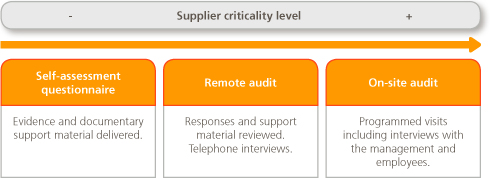 Abengoa
Abengoa
Annual Report 2012
- Corporate Social Responsibility
- People
- Suppliers
- Sistema de Compras Responsables
Abengoa is working to implement social responsibility in all of its lines of activity and therefore fosters and promotes, across the entire supply chain, the principles set forth in the Global Compact, the Declaration of Human Rights, compliance in regard to the indicators established by the Global Reporting Initiative (GRI) and the company’s own Code of Conduct.
In order to accomplish this objective, in 2011 Abengoa began to develop a Responsible Procurement System that incorporates sustainability criteria into the company’s assessment of its suppliers so as to classify them in terms of sustainability, while at the same time furthering responsible, transparent practices along the supply chain. This system establishes a collaborative model fostering long-term relationships and promoting good practices in every region where Abengoa operates.
Implementation of the system is split into four stages: preliminary procurement system diagnostic, supplier assessment, critical supplier audits, and supplier rating.
Preliminary procurement system diagnostic
LThe first stage of this process involves examining the different supplier types and special supplier characteristics in order to create a single model for supplier standardization and assessment.
Given the diversity of the activities conducted by the company and the different features of the suppliers contracted, the purchasing system at Abengoa is decentralized. Therefore, carrying out this phase required the collaboration of those involved in the procurement system from the main group companies in order to evaluate, among others, aspects including available computer resources, the existence of supplier catalogs, the supplier rating systems, criteria applied in the different activity segments, etc.
This initial diagnostic enabled the company to define a series of short-term initiatives (system definition, evaluation of critical suppliers, and execution of audits), as well as other plans for action to be carried out in the medium and long term (single model for standardization and assessment, unified supplier catalog, and social provider procurement).
Supplier assessment
This phase consists of annual supplier analysis based on a number of different variables, such as country of supplier location, nature of the product or service supplied and type of activity which the suppliers conducts, or on other more subjective factors associated with the company’s own perception of the supplier.
Analysis therefore starts with an assessment based on the risk level of the country where the supplier operates, during which the company takes into account recognized international indexes that categorize risk on the basis of respect for human rights (child labor, discrimination and freedom of association, among others), corruption levels and observance of civil and political rights. The basis of analysis is subsequently checked against the risk associated with the nature of the product or service supplied and the business of the supplier.
Once sensitive or critical suppliers have been identified according to the aforementioned variables, analysis is conducted on more subjective aspects related to Abengoa’s internal knowledge of the supplier, its relations with Abengoa or its customers and the provider’s presence in the supply chain, and so forth.
Critical supplier audits
This phase is intended to determine the extent to which the Abengoa provider ensures compliance with the principles set forth in the Social Responsibility Code (SRC) for suppliers.
An auditing procedure has been created for this purpose, defining aspects which should be reviewed and establishing the scope of work according to the degree of supplier criticality, and with the capability to perform analyses through self-assessment questionnaires, audits conducted remotely or on-site, including visits to the supplier’s facilities..

Although Abengoa has set the goal of performing onsite audits of 5 % of the supplies determined to pose a high risk, 99 audits of this type were conducted in 2012, which represents 16 % of the critical suppliers identified. That is, 11 % over the anticipated figure.

Supplier rating
The final stage in this process consists of ranking suppliers according to the assessment conducted, assigning them each a rank depending on aspects that include best practices, or otherwise excluding them should they fail to meet the requirements established under the SRC.
In 2012, some cases of “non-conformity” were detected during the supplier audits. When this occurs, the company draws up a plan of action in order for the supplier to adapt to the Abengoa requirements in order to continue working with the company.
The ultimate aim is to work together with these providers towards resolving issues of non-compliance, attempt to convey responsible conduct throughout the supply chain, and help providers assume responsible and sustainable practices in carrying out their processes.

Responsible Procurement System.

© 2012 Abengoa. All rights reserved
